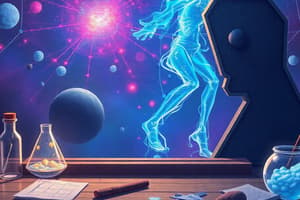Podcast
Questions and Answers
Which of the following is NOT a step in carrying out a scientific investigation?
Which of the following is NOT a step in carrying out a scientific investigation?
- Collecting and organizing data
- Identifying variables
- Defending conclusions (correct)
- Interpreting data in charts, tables, and graphics
What is the difference between an experiment and other types of scientific investigation?
What is the difference between an experiment and other types of scientific investigation?
- Experiments involve making predictions, while other types of scientific investigations do not
- Experiments involve manipulating variables, while other types of scientific investigations do not (correct)
- Experiments involve systematic observations, while other types of scientific investigations do not
- Experiments involve collecting and organizing data, while other types of scientific investigations do not
Why should scientific investigations be replicable?
Why should scientific investigations be replicable?
- To ensure that the results are accurate (correct)
- To allow for different interpretations of the data
- To provide opportunities for collaboration among scientists
- To increase the complexity of the investigation
What is the purpose of discussing, comparing, and negotiating methods, results, and explanations among groups of students conducting the same investigation?
What is the purpose of discussing, comparing, and negotiating methods, results, and explanations among groups of students conducting the same investigation?
Why is scientific knowledge considered durable?
Why is scientific knowledge considered durable?
Flashcards are hidden until you start studying
Study Notes
Scientific Investigations
- Carrying out a scientific investigation involves several steps, but guessing is NOT one of them.
Experiment vs. Other Investigations
- An experiment is a type of scientific investigation that involves manipulating a variable and measuring its effect on another variable.
- Other types of scientific investigations include observational studies, surveys, and case studies.
Replicability
- Scientific investigations should be replicable to ensure that the results are consistent and reliable.
- Replicability allows other researchers to verify the findings and increase confidence in the results.
Collaboration and Knowledge Sharing
- Discussing, comparing, and negotiating methods, results, and explanations among groups of students conducting the same investigation promotes collaborative learning.
- This process helps to identify errors, refine methods, and improve results.
Durability of Scientific Knowledge
- Scientific knowledge is considered durable because it is evidence-based and tested repeatedly.
- The repetition of investigations and the accumulation of evidence over time make scientific knowledge more reliable and long-lasting.
Studying That Suits You
Use AI to generate personalized quizzes and flashcards to suit your learning preferences.




